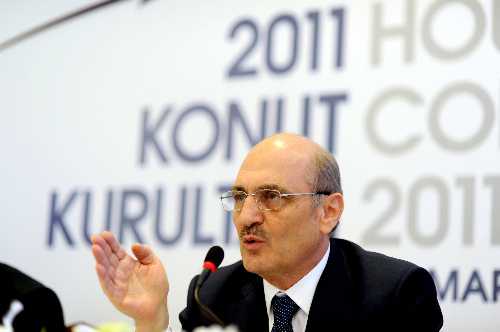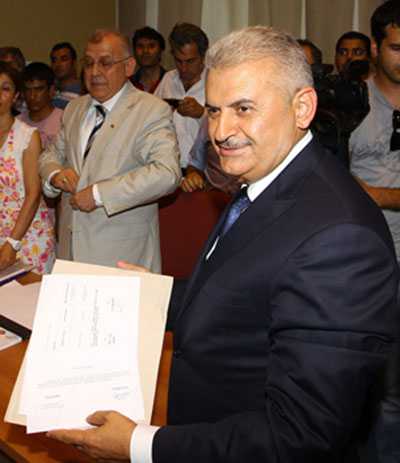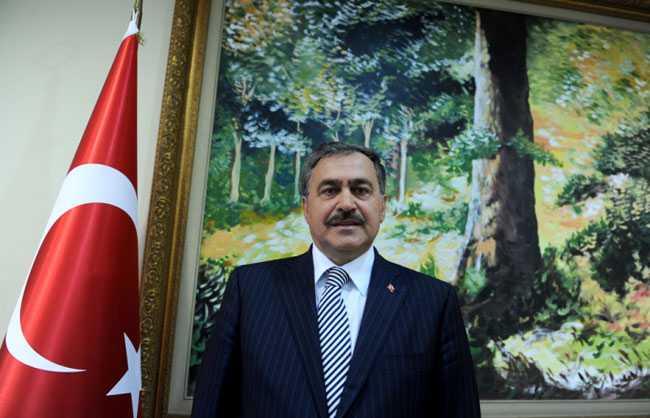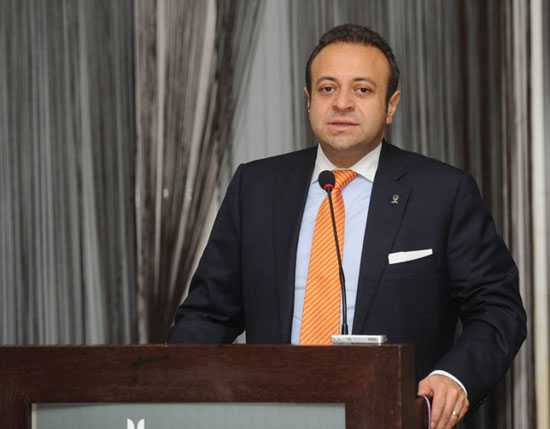Turkish Prime Minister Recep Tayyip Erdogan has announced the members of the 61st Council of Ministers.
The new cabinet has four deputy prime ministers and 21 ministers.
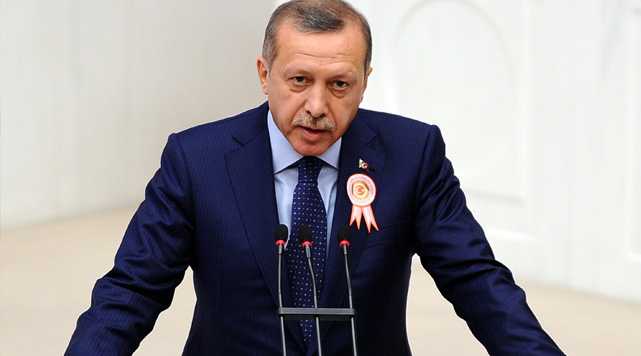 Erdogan’s biography on the ruling Justice and Development (AK) Party’s official web-site is as follows:
Erdogan’s biography on the ruling Justice and Development (AK) Party’s official web-site is as follows:
With family origins in Turkey’s Rize, Recep Tayyip Erdogan was born in Istanbul on February 26, 1954. He graduated in 1965 from Kasimpasa Piyale Elementary School and in 1973 from Istanbul Religious Vocational High School (Imam Hatip Lisesi). Erdogan received his high school diploma from Eyup High School where he took a graduation exam. Erdogan graduated in 1981 from Marmara University’s Faculty of Economics and Commercial Sciences.
Preferring to blend his social life with politics from his early days, Erdogan embraced the disciplined teamwork and team spirit that football taught him ever since he first started to play the game at a young age. He engaged in the sport as an amateur over the years 1969-1982. It was also in those years that, as a young idealist, Recep Tayyip Erdogan began to feel a concern for national issues and the problems of society. This is when he took the first step in participating in active politics.
An active member of various branches of the Turkish National Students’ Union in his high school and university years, in 1976, Recep Tayyip Erdogan was elected Chairman of the Beyoglu Youth Branch of the National Salvation Party, MSP, later to be elected Chairman of the Istanbul Youth Branches of the party in that same year. Erdogan continued to occupy these posts until 1980. Following the September 12 military intervention which closed down all political parties, Erdogan worked in the private sector as a consultant and a senior executive.
When the Welfare Party was established in 1983, Recep Tayyip Erdogan returned to politics and in 1984 he became Beyoglu District Chairman of that party. In 1985, he was appointed the party’s Provincial Chairman for Istanbul as well as a member of its Central Decision-making and Executive Board. While acting as Provincial Chairman for Istanbul, Erdogan initiated a reorganization which served as a model for other political parties. In this period, Erdogan worked to increase the participation of women and young people in politics and took important steps in creating a grassroots movement by encouraging larger sections of the society to take an interest in politics. This reorganization earned the Welfare Party huge success in the Beyoglu district in the local elections of 1989, and became a model for political efforts all around the country.
Recep Tayyip Erdogan was elected Istanbul Mayor in the local elections of March 27, 1994. With his political skills, the importance he placed on teamwork, his successful management of human resources and financial matters, Erdogan was able to make correct diagnoses and create solutions for the many chronic problems of Istanbul, one of the most important metropolitan areas of the world. The water shortage problem was solved with the laying of hundreds of kilometers of new pipelines. The garbage problem was solved with the establishing of state-of-the-art recycling facilities. Air pollution was eliminated while Erdogan was in office with a plan that was developed to switch to natural gas. The city’s traffic and transportation jams were tackled with more than 50 bridges, viaducts and highways. Many projects that would shed light on the problems of later years were developed. Erdogan further took measures to ensure that municipal funds were used prudently, at the same time taking severe precautions to prevent corruption. Erdogan paid back a major portion of Istanbul Metropolitan Municipality’s debt, which was two billion dollars when he took office, and meanwhile invested four billion dollars in the city. Opening an entirely new era in municipality affairs in Turkey, Erdogan became a model for other municipalities, while also earning a high level of public trust.
Recep Tayyip Erdogan was sentenced to a prison term because of a poem he recited on December 12, 1997 in a public address in the province of Siirt. The poem was quoted from a book published by a state enterprise and one that had been recommended to teachers by the Ministry of Education. He was removed from the office of Istanbul Mayor due to this.
After four months in prison, Recep Tayyip Erdogan responded to the insistent demands of the public in an environment of improved democratic conditions, and established the Justice and Development Party (AK Party) with a group of friends on August 14, 2001. He was subsequently elected Founding Chairman of AK Party by the Founding Board. From its first year, the confidence and trust of the people in AK Party resulted in its becoming the largest publicly-supported political movement in Turkey. In 2002, the general elections resulted with AK Party winning two-thirds of the seats in parliament, forming a single-party government.
Not permitted to become a candidate deputy in the elections of November 3, 2002 because of the court order against him, Erdogan participated in the renewal elections for the province of Siirt on March 9, 2003 upon the lifting of the legal obstacles to his candidacy for parliamentary membership. Receiving 85 percent of the votes in this election, Erdogan became a deputy for the province of Siirt for the 22nd Term of Parliament.
Appointed Prime Minister on March 15, 2003, Recep Tayyip Erdogan continued to harbor his ideal of a bright and rapidly developing Turkey, implementing numerous reforms of vital importance within a short period of time. A great deal was achieved in democratization, attaining transparency and preventing corruption. Parallel to this, inflation, which had adversely affected the country’s economy and the people’s psychological state of mind for decades, was finally taken under control and the Turkish Lira retrieved its former prestige through the elimination of six zeros. Interest rates for public borrowings were pulled down, per capita income grew significantly. A host of new dams, housing projects, schools, hospitals and power plants were inaugurated at a pace never before witnessed in the history of the country. All of these positive developments were named “the Silent Revolution” by some foreign observers and Western leaders.
In addition to the major initiatives that have been characterized as turning points in the country’s journey toward becoming a member of the European Union, Recep Tayyip Erdogan’s sensible foreign policy and intensive diplomatic visits have paved the path for a lasting solution in the Cyprus issue and the development of productive relations with several countries around the world. With the stability that has been achieved, Turkey’s internal dynamics have been revived, causing it to be a central point of interest. Turkey’s foreign trade volume and political power have increased not only in its own geographical region, but on an international scale as well.
Recep Tayyip Erdogan is married and the father of four.
AA
